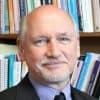A Maryknoll priest opens doors for low-income blind people in Peru
María Inés Aspilcueta’s dream as a young girl was to be a teacher. However, after graduating from high school in Lima, Peru, she had to work to help support her family.
Then, in her early 20s, she began losing her sight due to glaucoma. By age 26 she had become completely blind, and went into a severe depression which lasted three years.
“I realized I couldn’t do anything solo. I was in shock,” she says. “I stayed in my room crying, asking, ‘Why me?’ and wondering why did I have to go through this.”
Eventually, she heard of and attended the Centro de Rehabilitación de Ciegos de Lima (the Lima Rehabilitation Center for the Blind), where she learned to use a cane to walk, to read and write braille, and to manage other daily activities.
“I thought I was the only person who had gone blind in life,” Aspilcueta, 39, says. “But when I got to the center, I realized there were lots of blind people.” From then on, her life began to improve little by little, she says.
The biggest change came when she was invited to learn massage at Casa Bartimeo del Sur, a nonprofit center that teaches massage therapy to low-income blind people.
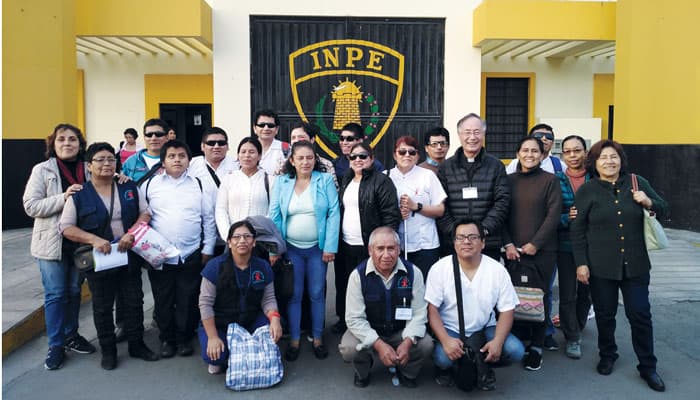
Father Kyungsu Son, in Roman collar, poses with students, teachers and assistants of Casa Bartimeo during a massage practice in Lima, Peru. (Courtesy of Kyungsu Son/Peru)
The center, located in a former Maryknoll Sisters convent at Niño Jesús parish in Ciudad de Dios in the south of Lima, was founded by Grimaldo Zapata, who was blinded in a mining accident as a young man, and Maryknoll Father Kyungsu Son. The Maryknoll missioner helps support the Bartimeo center under the auspices of the Maryknoll Fathers and Brothers and the Diocese of Lurín.
Casa Bartimeo is named after the blind man, Bartimaeus, who was healed by Jesus in the Gospel of Mark (10:46–52).
“Casa Bartimeo is helping people with visual disability so that we can be independent,” says Aspilcueta, who was in the first class at the center in 2013. “Instead of being a burden to our families or society, we can be part of the economic development of the country and our families.”
After graduating from the Casa Bartimeo course, Aspilcueta opened her own consulting room in a commercial shopping center with two massage tables, employing another Bartimeo graduate to help her.
For Father Son, Casa Bartimeo is not just about helping people such as Aspilcueta to become more independent; it’s a ministry to some of the most marginalized people in Peru. His ministry has expanded to address other needs of the blind, such as health issues, and to include a group of people who can see but are often unseen: inmates in the country’s prison system.
When Casa Bartimeo first opened, the school needed to find a way to provide students with hands-on practice for certification. Initially, Zapata and Father Son were stumped about where to find enough people to receive therapeutic massages from the program’s 20 trainees.
Father Son came up with the solution: a captive audience.
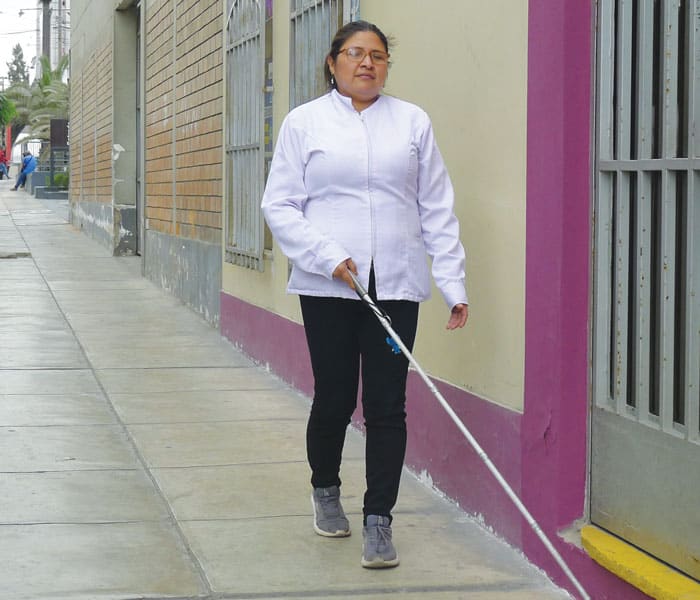
María Inés Aspilcueta walks to her therapy center, located in a shopping center. Aspilcueta belonged to the first class of blind therapists trained in massage by Casa Bartimeo del Sur. (Lynn Monahan/Peru)
He was then chaplain of a men’s prison with 500 inmates, who he realized suffered from stress and other health issues that could be alleviated by massage. The class spent a month providing therapeutic massage to male prisoners without incidents. When the men’s prison closed a year later and the inmates were sent to prisons far from Lima, the Casa Bartimeo students began practicing at a nearby women’s prison.
Jorge Luis “Lucho” Peláez, who can see and who volunteers when the massage therapists go to the prison, credits Father Son with having the insight to help two groups of people at once: students who need to practice massage techniques and inmates who suffer physically and mentally in prison.
“To be confined is brutal,” Peláez says. “It doesn’t just hurt their soul or their spirit, it also hurts them physically.”
For the inmates, the experience is so emotional that both men and women often cry during massage sessions, he says. “The hands of the student practitioners lift their spirit so that they can endure this intense burden.”
Father Son says, “It’s social and pastoral work, poor blind people helping poor inmates.”
Richard Piccón, a massage therapist who, like Aspilcueta, was in the first group of massage students, is a part-time auxiliary teacher at Casa Bartimeo. He says he is grateful for the opportunity to help someone else. He tells the story of an inmate whose perspective impacted him.
Piccón recalls, “An inmate said to me, ‘I’m getting out in four years. But Richard, you have a life sentence.’”
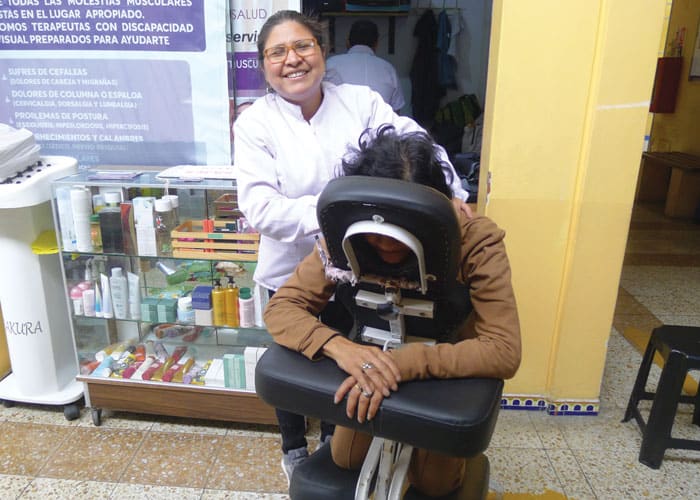
María Inés Aspilcueta demonstrates a short massage on her mother, Senaida Muñoz. Aspilcueta is able to earn a living thanks to the massage skills she learned after going blind at 26. (Lynn Monahan/Peru)
He continues, “I have accepted that. I have a life sentence, because I’m never going to see again. What I have learned during these years is simply gratitude for life, because I’ve met people whom I don’t judge. I don’t think about what they did or didn’t do. I only see human beings who need help and I have the strong sense of knowing I can help them.”
The massage sessions at the prison are so popular that the center can’t accommodate all the requests. Father Son says that he, Zapata and the rest of the Casa Bartimeo team have come up with a plan. They propose to train the inmates themselves in massage therapy in prison, teaching skills that will also serve them when they are released. Casa Bartimeo will present the proposal to prison officials this spring.
“The inmates helped the blind, and now we’re returning the favor,” says Father Son, 78, who was ordained a Maryknoll priest in 1979.
Casa Bartimeo isn’t the only place in Lima where blind people can learn massage therapy, says Zapata, but its mission is unique: to help the blind who don’t have the resources for training.
Zapata lost his vision at age 25 and says he had to learn to adapt to life without sight. Once he accepted his reality, he won a scholarship to learn Japanese shiatsu massage. Afterward, Zapata began to pursue other forms of massage and physical therapy.
Building on his own success, he dreamed of opening a massage training center to help other low-income blind people earn a living.
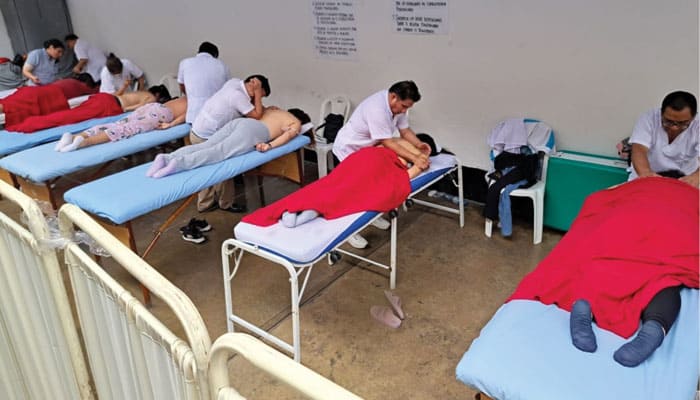
Blind students of massage therapy from the Casa Bartimeo training center in Lima practice on inmates at a women’s prison. (Courtesy of Kyungsu Son/Peru)
At first, Zapata could not find anyone — neither in the government nor municipal agencies — willing to support the project. A friend suggested he approach Father Son.
“And he told me, ‘Grimaldo, I’m going to help you,’” Zapata recalls.
Father Son, who is originally from South Korea, says it is he who has been helped by the blind. Normally, he says, “the pastor goes out in search of the sheep, but in this case the sheep, the blind, came to me. It’s the reverse. And they offered me this project to help.” His inspiration, he says, comes straight from the Gospel, adding, “I came to serve.”
His reward, he says, is the success of the 180 students trained so far by Casa Bartimeo.
Aspilcueta recently opened a second massage clinic, with four tables, in the upscale Miraflores section of Lima.
She also accomplished another goal through Casa Bartimeo. Since 2015, she has been an auxiliary teacher at the center, working alongside Zapata and Piccón.
“María Inés is an outstanding example of the success of Casa Bartimeo,” Father Son says. “Her skill, her enthusiasm and her compassion are wonderful examples for new students coming in.”
Featured image: Blind students perform massage therapy during training at Casa Bartimeo del Sur in Lima, Peru. Maryknoll Father Kyungsu Son founded the training center in 2013 with Grimaldo Zapata, who lost his sight in a mining accident. (Nile Sprague/Peru)
![]()

